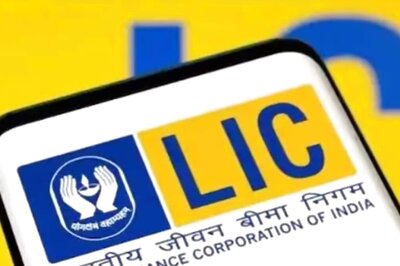
views
When Finance Minister Pranab Mukherjee presents the Union Budget 2012 on March 16, experts will be keenly hearing his comments on fiscal deficit. India's fiscal deficit is a cause for worry now. It is expected to exceed the targeted 4.6% of GDP.
Former finance secretary S Narayan says, fiscal deficit in percentage terms will be optically low due to inflation. "Projected fiscal deficit for the next year is unlikely to be below 5%," he adds. According to him, one needs to look at borrowing figures closely in the Budget.
Narayan says, Oil and Natural Gas Corp 's (ONGC) auction was mismanaged. ONGC share auction was affected by a system glitch due to large last minute orders. He further says, the auction needed better co-ordination. "The auction was mispriced and didn't factor in the market condition," he asserts.
Below is the edited transcript of his interview with CNBC-TV18's Udayan Mukherjee and Mitali Mukherjee. Also watch the accompanying videos.
Q: How you have read this reworked plan by the government in order to raise cash from some of the public listed companies and what look like a fiasco that went down with ONGC yesterday?
A: A little bit of strategy in putting it into the market was lacking from the investment ministry, the finance ministry, disinvestment ministry and the petroleum ministry. They saw that the market was going down. They priced the issue fairly high. They didn't have plan B of picking up the shares, if the retail interest was not there. So, I think a bit of strategy was missing.
I do hope going forward, when they do the disinvestment of the other PSUs, they would work out a very carefully planned strategy. We saw only last week a very well managed public issue where a private company was able to get 55 times its offer subscribed. So, I think there is a lesson to be learnt there more on the processes and the details, nitty-gritty of the offer. This is very important because it makes a difference between Rs 12,000 crore and Rs 8,000 crore, it makes a difference in asking LIC to come in at the last minute to pick up the shares. So, I think there are a lot of lessons to be learnt in pushing through this disinvestment carefully.
Is it important? I think it's important because if this is not done then there is very little room for the finance minister in the forthcoming Budget. The fiscal deficit is fairly large, it's very big. If he allows this fiscal overhang to carry-on to the next year then he would have very little room for anything in the Budget in terms of any expansionary public expenditure. He would have to go and cut subsidies very seriously, he would have no opportunity of giving any benefits to industry or manufacture.
The effort that the government is making, at this time, I would call it a necessary effort. I would perhaps call it an effort that is dictated by the circumstances in which the effort is being made.
Q: Do you think the Finance Minister can in anyway indicate a sub-5% fiscal deficit target for next year, given the way growth is and the kind of growth assumptions that he may realistically be working with or be projecting as also the kind of subsidy pressures that are coming in now from crude oil etc? Do you think it's possible that he can indicate sub-5% number, which the market or economic participants will believe?
A: I think there is a clever arithmetic in the fiscal deficit, if you are looking at it in terms of percentages. If you have a high inflation rate then automatically the GDP in nominal terms goes up. The denominator goes up. So, with the same kind of a gap, you can still show a lower deficit. In a way, you are inflating your way out of the fiscal deficit. So, the numbers of 5-5.5% need to be viewed with caution.
What you need to look at very carefully is the kind of borrowing that the government is making. If the borrowing is going to be substantially higher than what it was last year and if it is eating into the total amount of liquidity that is available in the market then you have a serious problem; money available for capital investment, infrastructure money available in the market reduces. So, without the inflationary numbers, I don't think he can give a number which is lower than 5%.
Q: What is your sense of how growth will pan out? We had 6.1% print on the GDP few days back. People, who we speak to, are saying that that is the trough and we should not worry about it because things are substantially on the mend, despite some of the capital formation figures looking quite awful. Should one be complacent about how tepid growth could be over the next four-five quarters?
A: My anxiety comes from a slightly different source. If you read the report of the Prime Minister's Economic Advisory Council, they saying that you would get about 7% growth and it is good compared to the rest of the world. So, in a way, we have started patting ourselves on the back that we are going to be around 7%, which is better than a lot of countries. That means somewhere along the line the real fight for getting 8-9% growth has been more or less given up.
If you look at the capital formation, the numbers are certainly worrying. That means that the results of any fresh capital formation would be available in the goods and services sector only about two-three years down the line. That means that certainly an immediate improvement in 2012 appears very unlikely. So, with the best efforts of the Finance Minister, with the best possible opportunities of FII flows, money flows and even if FDI is opened up in several sectors, I do see that 2012 being only close to 7%, at the most 7.5%, no better than that.
Q: What would strike a warning bell to your mind in terms of the borrowing figure that the Finance Minister sets out? By extension of that, what kind of position does that leave the Reserve Bank, which in any case is struggling to manage what is a very tight liquidity situation and they haven't been able to move on rates yet?
A: I think bond yields, particularly government bond yields, would be a signal. At this moment, the bond yields are artificially kept a little low because of the OMO operations that the Reserve Bank is doing. But if it were not doing that and this is the kind of a borrowing that the government is going to make in the market then one would certainly see interest rates of these bonds having to go up. That would be worrying.
A major worry for me and signal worry for me was the recent issue of tax free bonds by people like NHAI and by other companies, which offered more than 8% tax free. That means government, in a way, surrogate of the government is prepared to pay 12% pre tax for borrowing. That's a huge burden on any kind of industry or infrastructure or any kind of public expenditure activity. So, these are the kind of signals that I find very much worrying that the government has to borrow a costlier paper. Unless it is directing these funds into areas where the returns are atleast equal to the borrowing rates, I think we would be starting to dig ourselves into a fairly deep hole.
Q: Growth has slipped considerably over the last few quarters, but the sense seems to be that in this Budget the government will not be able to move too much in terms of spend either on any of the rural schemes or on infrastructure. It's going to be more or less status quo with few incentives here and there. In that case, would you be more worried about what the course of growth maybe over the next few quarters or atleast through this calendar year?
A: I think consumer demand is still robust. Employment formation in the goods and services sector, particularly in the services sector IT, continues to be robust. If employment growth is robust, that means consumer demand will continue to be robust. So, I don't think that you would see great softening of the Indian growth story.
It is important that the Finance Minister incentivises this growth. He can do that by providing some good incentives for the manufacturing industry. In fact he can target those industries which are growing very fast and give opportunity for them to grow little faster. He could give incentives to exporters. He could give incentives for bringing in more capital through ECBs. He could give incentives for fast tracking power projects and other infrastructure projects.
I think there is a lot that he can do by giving a few incentives, which would not necessarily have immediate revenue implications. So, I would even think that that is a good way for the government to proceed, while at the same time going back to the expenditure control board and saying where one can control expenditure. He can perhaps bring back his earlier idea of reducing subsidies on diesel, providing for some kind of LPG distribution where the number of cylinders under subsidy is limited.
There are a lot of opportunities available to him. All in all, I do see this Budget as an opportunity for him to have course correction, to have a good developmental Budget, given the fact that the fiscal room is limited.




















Comments
0 comment